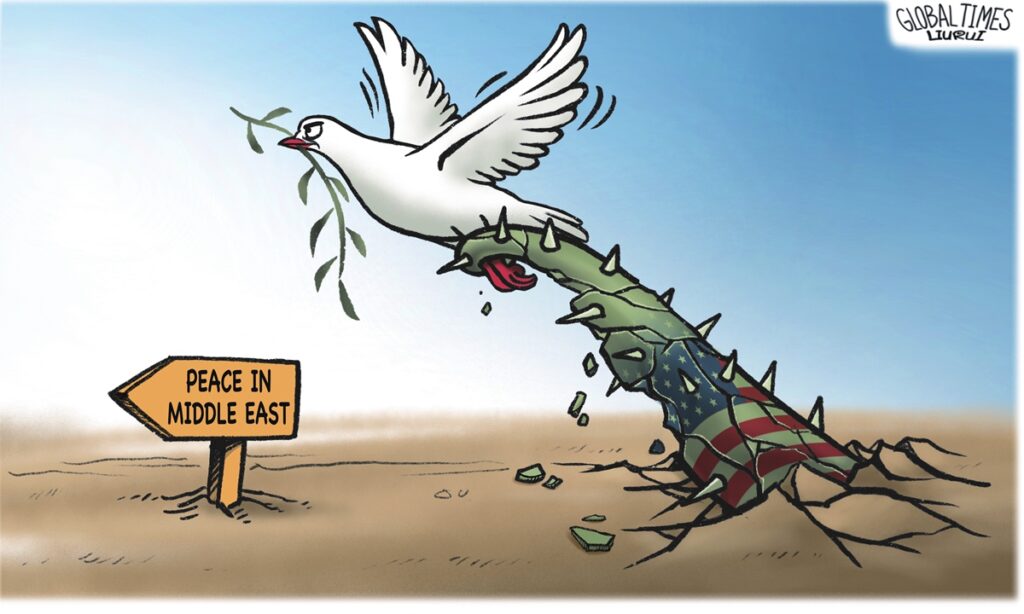In recent weeks, the situation in the Middle East has continued to escalate, with Lebanon in particular suffering what is considered “the most deadly and intense” military strike in decades. First, thousands of communication devices within Lebanon were indiscriminately detonated remotely at the same time, followed by multiple rounds of large-scale airstrikes by Israel on Syria and southern and eastern Lebanon. Earlier this month, Israel launched a ground offensive against Lebanon, while its own military and security targets were also hit by a large-scale missile attack from Iran. On one hand, a full-scale war seems imminent, and on the other, the humanitarian disaster is deteriorating at an alarming rate. The future of the Middle East is becoming a severe test for all parties involved in the conflict, as well as the international community.
Neither Lebanon nor the entire Middle East should become a “living hell” engulfed in the flames of war. The “collective punishment” and indiscriminate attacks targeting civilians must be stopped immediately. As of now, 2 million residents of Gaza are still struggling to survive under blockade and bombardment, and Lebanon must not become the next Gaza. Since the end of September, people from a quarter of Lebanon’s territory have been under Israeli military displacement orders, with over 600,000 people displaced internally and more than 300,000 fleeing the country. Since October last year, the Lebanon-Israel conflict has claimed 2,141 lives and injured 10,099 people in Lebanon. Behind these numbers are countless shattered families and immense human suffering. Such a tragedy should not take place in a civilized society in the 21st century.
As we reach the one-year mark since the outbreak of the new round of the Palestinian-Israeli conflict, it is heartbreaking to see that the bleeding wound of the Middle East has not healed. Instead, more countries have become involved in the war, and the intensity of the conflict continues to escalate. To protect its allies, the US has expanded its military presence in the Middle East and helped Israel intercept missiles fired from Iran. Meanwhile, none of the military confrontations has increased the sense of security for any nation in the Middle East. It has become evident that decades of US military intervention in the Middle East have not made Israel safer. On the contrary, these actions have given rise to more regional armed resistance, making Israel’s security environment even more fragile. Additionally, the conflicts and resentments between the peoples and religious factions of the Middle East have deepened with the escalating warfare.
The Middle East, dominated by violence, is like a vehicle without brakes, constantly on the verge of plunging off a cliff. The horrifying pager explosion incident sends a grim warning in an extreme way: the combination of hatred and high-tech warfare is pushing the brutality of modern conflict to new heights. Right now, the disregard for life and human rights in the Middle East has reached an appalling level. The air is thick with the stench of blood and an overwhelming sense of fear, all serving as stark reminders that war is never the right solution. It will only bring misery and disaster.
The window of opportunity for restoring peace in the Middle East is rapidly closing, and the urgent priority is to halt military adventurism and de-escalate the situation. On October 9, US President Joe Biden had his first conversation in almost two months with Israeli Prime Minister Benjamin Netanyahu, but Israel’s attacks on multiple areas in the Middle East continue, with Israel vowing to retaliate against Iran in a “lethal, precise, and surprising” manner. While Washington has verbally called for a ceasefire, it has provided at least $17.9 billion in military support to Israel over the past year, effectively becoming a driving force behind the region’s ongoing “cycle of violence.”
On the same day, China’s permanent representative to the United Nations Fu Cong made a strong statement during a Security Council meeting, urging the country concerned to prioritize the saving of lives, show political will, take an impartial stand, give up its political calculations, and exert all available influence on the relevant party. China’s consistent stance is to rely on diplomatic efforts rather than military means, which is also the only viable path to resolving the Middle East crisis and pulling the region back from the brink of a full-scale war.
Ultimately, the foundation for lasting security across the Middle East lies in the ability of Israel and Palestine to achieve peaceful coexistence. The “two-state solution” offers a roadmap for both parties to live peacefully on the basis of mutual recognition and security. It should be seen as a key to breaking the curse of prolonged conflict and the cycle of violence in the region, which deserves more attention and active promotion. Diplomatic mediation in the Middle East requires sincerity and cooperation from all sides. In this process, the UN, as the most central organization for maintaining international peace and security, carries the heavy responsibility of peacefully resolving crises and faces tremendous challenges. It must not be marginalized.
In war, there are no winners, only victims. Pulling the Middle East back from the brink of a full-scale war, de-escalating tensions, enforcing a ceasefire, and preventing humanitarian disasters are not only international consensus but also the shared responsibility of the global community.
Hopefully all parties will act in the interest of regional peace and stability, approaching the current situation with calm, rationality, and responsibility. Major powers with influence, in particular, should play a constructive role in this process.
GT




